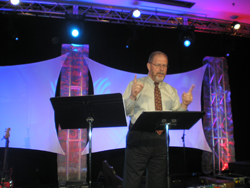The fledgling Fellowship of Presbyterians (FOP) was described here Aug. 25 as an empty warehouse, and the 1,900 Presbyterians gathered for the group’s first get-together were invited to fill it up between now and January 2012, when the next FOP gathering will be held in Orlando, Fla.
“The world does not need another denomination,” said the Rev. John Crosby, pastor of Christ Presbyterian Church, Edina, Minn. and a member of the FOP’s seven-member steering committee, “but continuing on the same path is a dead end and we’re not going to do that anymore.”
Crosby said FOP leaders have met with Presbyterian progressives and Presbyterian Church (U.S.A.) denominational leaders, and “all sides agree that the denomination is broken badly. What we believe is that it cannot be fixed.”
Though the current chasm in the PC(USA) is over the recent ratification of Amendment 10-A ― which replaces the constitutional requirement that church officers practice “fidelity within the covenant of marriage between a man and woman or chastity in singleness” with language that calls for “joyful obedience to Jesus Christ” but doesn’t single out sexual behavior ― that measure “is merely a symptom, a signal,” said the Rev. Jim Singleton, pastor of First Presbyterian Church in Colorado Springs, Colo., and also a FOP steering committee member.
Central to the malaise in the PC(USA), Singleton said, “is the erosion of the way we understand biblical authority … We’re in a box canyon and we’re not sure how to move because it seems like a dead end, fracturing the church.”
FOP leaders envision the organization ― it has already legally incorporated ― as an “umbrella” for Presbyterian congregations who wish to “differentiate” themselves from the PC(USA), Crosby said, noting that the different contexts in which congregations find themselves will determine how they proceed.
At least four possible options are being considered here:
- Remaining within the PC(USA) but being more selective in participation in denominational matters;
- Creating new presbyteries within the bounds of existing presbyteries for “like-minded” congregations;
- Creating dual Committees on Ministry and Committees on Preparation for Ministry in existing presbyteries based on support for or opposition to the PC(USA)’s new ordination standards;
- Creating a new Reformed body, with some churches departing the PC(USA) and others maintaining “dual citizenship, at least in the near term”;
“The Fellowship is an empty warehouse right now,” Crosby said. “Between now and January we hope you will help us fill it.”
The group’s immediate plans call for break-out sessions during this conference so congregations can explore more fully the options being proposed; regional gatherings during the fall; development of foundational documents ― a purpose statement, statements of theological essentials and structural proposals; and a second national gathering Jan. 12-14 in Orlando.
Singleton emphasized that the Fellowship is not operating out of anger.
“We are not mad ― our solutions will not come from our anger,” he said. “We’re not throwing rocks ― that’s not going to help us … Louisville is not the problem ― the virus is in the church. We’re sicker than we know.”
Crosby agreed. “We will not demonize the PC(USA) ― anger and fear are not the trademarks of Christianity,” he said.
Singleton said the group’s vision includes “redefining our theological clarity and our missional passion,” creating structures that are “relational rather than regulatory,” deeply connecting globally and developing leadership “in a very different way.”
The Fellowship’s vision is rooted in congregations, Crosby said. “Our purpose is to connect like-minded churches for common ministry and mission. For many it has been a long time since many Presbyterians felt that way.”
Like-minded is not the same is same-minded, Crosby said. “We mean like-minded based on our long-held theological essentials. We have created such a big tent that there is no longer any center pole to hold the whole thing up. We want to be clear about the center rather than having to police the boundaries.”
Crosby acknowledged that “most of the work lies ahead,” but “we have a unique opportunity to move ourselves into the post-denominational future.”

